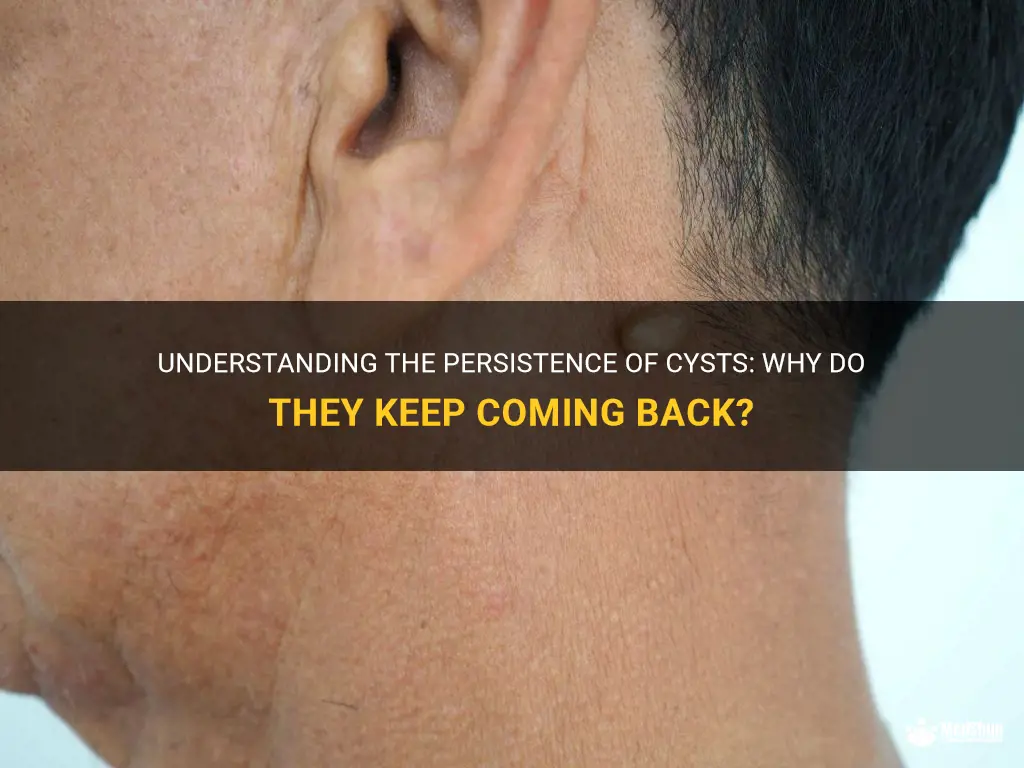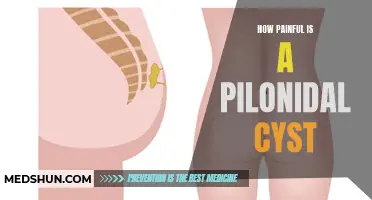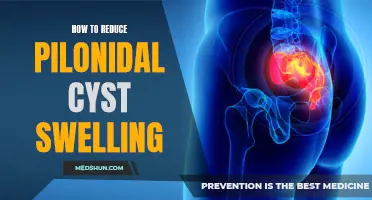
Cysts are frustrating and seemingly persistent skin growths that can continue to reappear despite attempts to remove or treat them. Have you ever wondered why a cyst keeps coming back? This intriguing phenomenon can be attributed to various factors such as incomplete removal, underlying medical conditions, or even genetic predisposition. Understanding the reasons behind the recurrence of cysts can shed light on how to effectively manage and prevent their return in the future. So, let's dive deeper into this vexing issue and uncover the mystery of why cysts seem to have a knack for resurfacing time and time again.
| Characteristics | Values |
|---|---|
| Location | Can occur anywhere on the body |
| Type of cyst | Can be sebaceous, pilonidal, or ganglion cyst |
| Genetics | Can run in families |
| Hormonal changes | Fluctuations in hormones can trigger cyst development |
| Blocked ducts | Cysts can form when ducts or glands become blocked |
| Trauma or injury | Cysts can develop as a result of previous trauma or injury |
| Inflammation | Inflammation in the body can contribute to cyst formation |
| Infection | Cysts may become infected, leading to recurring cysts |
| Residual tissue | Incomplete removal of a cyst can lead to regrowth |
| Immune system issues | Impaired immune function can contribute to recurrent cysts |
What You'll Learn
- What are the common causes for a cyst to keep coming back?
- How can an untreated cyst lead to recurrent formations?
- Are there any underlying medical conditions that can contribute to the recurrence of cysts?
- What treatments are available to prevent cysts from coming back?
- Can lifestyle changes or dietary modifications help in preventing the recurrence of cysts?

What are the common causes for a cyst to keep coming back?
Cysts are fluid-filled sacs that can form in various parts of the body. While most cysts are harmless and go away on their own, some may continue to return even after treatment. Understanding the common causes for cyst recurrence can help individuals take appropriate steps to prevent or manage these recurring cysts.
- Incomplete Removal: One of the primary reasons why a cyst may come back is if it was not completely removed during the initial treatment. If a portion of the cyst wall or contents is left behind, it can lead to regrowth of the cyst. It is essential to ensure thorough removal of the cyst to minimize the chances of recurrence.
- Genetic Predisposition: Some individuals may have a genetic predisposition to developing cysts. If you have a family history of cysts, you may be more prone to recurring cysts. Genetic factors can influence the rate of cyst formation and recurrence.
- Infection: Infection can contribute to cyst recurrence. If a cyst becomes infected, it can lead to inflammation and tissue damage, increasing the likelihood of future cyst formation in the same area. Proper management of infections through antibiotics or other suitable treatments is crucial to prevent the cyst from coming back.
- Chronic Inflammatory Conditions: Certain chronic inflammatory conditions, such as acne or chronic folliculitis, can cause recurring cysts. These conditions produce an environment conducive to cyst formation, and unless the underlying inflammatory condition is effectively managed, cysts may continue to recur.
- Hormonal Imbalances: Hormonal imbalances, such as those seen in polycystic ovary syndrome (PCOS), can contribute to recurring cysts. Hormonal fluctuations can disrupt the normal ovarian function and lead to the formation of ovarian cysts. Balancing hormone levels through medication or lifestyle changes can help prevent the recurrence of cysts associated with hormonal imbalances.
- Trauma: If a cyst is traumatized or ruptured, it can increase the risk of recurrence. Trauma can result from external factors or even from internal factors, such as vigorous physical activity or sexual intercourse. Taking precautions to prevent trauma to the cyst, such as avoiding excessive pressure or force, can help reduce the chances of recurrence.
- Foreign Bodies: Sometimes, foreign bodies, such as hair or debris, can become trapped inside a cyst. These foreign bodies can cause irritation and inflammation, leading to the formation of a new cyst or the recurrence of an existing one. Ensuring proper cleanliness and avoiding the introduction of foreign bodies can minimize the risk of cyst recurrence.
When dealing with recurring cysts, it is crucial to consult a healthcare professional for an accurate diagnosis and personalized treatment plan. The appropriate management may involve removal of the cyst, addressing any underlying conditions, and implementing preventive measures to reduce the chances of recurrence. Following the recommended treatment and taking steps to avoid the common causes of cyst recurrence can greatly help in managing and preventing the return of cysts in the future.
Understanding the Causes and Solutions for an Itchy Tailbone
You may want to see also

How can an untreated cyst lead to recurrent formations?
An untreated cyst can indeed lead to recurrent formations. This occurs because the cyst itself is not properly resolved and the underlying cause remains untreated. This can create an environment in which new cysts can form, leading to a cycle of recurrent formations. In this article, we will explore why an untreated cyst can lead to recurrent formations and discuss the steps that can be taken to address this issue.
Firstly, it is important to understand what a cyst is and how it forms. A cyst is a sac-like pocket of tissue that can develop in various parts of the body. It typically contains fluid, air, or other substances and can vary in size. Cysts can form as a result of infection, trauma, or genetic factors, among other causes.
When a cyst is left untreated, the underlying cause of its formation is not resolved. For example, if a cyst is caused by a blocked duct or gland, leaving it untreated means that the blockage remains in place. This can create an environment in which new cysts can form, as the blockage is still present and can continue to trap fluid or other substances.
Additionally, if a cyst becomes infected and is not properly treated, the infection may not fully resolve. This can lead to chronic inflammation in the area, which can increase the likelihood of recurrent cyst formations. Inflammation can cause the tissues to become weaker and more prone to the development of cysts.
Furthermore, an untreated cyst can continue to grow in size over time. As it expands, it can put pressure on surrounding tissues and structures, potentially leading to further complications. For example, if a cyst grows near a nerve, it can compress the nerve and cause pain or other symptoms. This can also contribute to the formation of new cysts, as the pressure on surrounding tissues can create an imbalance and disrupt normal physiological processes.
To address the issue of recurrent cyst formations, it is crucial to properly treat the initial cyst and its underlying cause. This may involve drainage of the cyst, removal of any blockages, or addressing any infections present. In some cases, surgery may be required to remove the cyst entirely.
In addition to treating the initial cyst, it is also important to address any underlying factors that may contribute to its formation. This may involve lifestyle changes, such as maintaining proper hygiene or avoiding certain triggers that can lead to cyst formation. In some cases, underlying medical conditions may need to be treated, such as hormonal imbalances or autoimmune disorders.
Regular follow-up appointments with a healthcare provider are essential to monitor the progress and ensure that the cyst has been fully resolved. This can help prevent recurrence and address any potential complications before they become more severe.
In conclusion, an untreated cyst can indeed lead to recurrent formations. This occurs because the underlying cause of the cyst is not properly resolved, allowing for the potential for new cysts to develop. To prevent this cycle of recurrence, it is crucial to address the initial cyst and its underlying cause through proper treatment and monitoring by a healthcare provider. By doing so, the risk of recurrent cyst formations can be significantly reduced, allowing for improved health and well-being.
Recognizing the Appearance of a Tailbone Cyst
You may want to see also

Are there any underlying medical conditions that can contribute to the recurrence of cysts?
Cysts are pouch-like structures that can form in various parts of the body, including the skin, organs, and bones. They can vary in size, from small, undetectable ones to large, painful growths. While most cysts are harmless and go away on their own, some can recur or become problematic if there are underlying medical conditions present.
There are several underlying medical conditions that can contribute to the recurrence of cysts. Let's take a closer look at some of them:
- Polycystic Ovarian Syndrome (PCOS): PCOS is a hormonal disorder that affects women of reproductive age. It is characterized by the growth of multiple cysts on the ovaries. These cysts can cause irregular periods, infertility, weight gain, and other symptoms. Women with PCOS are more prone to developing ovarian cysts, and these cysts can recur if the underlying hormonal imbalance is not addressed.
- Kidney Disease: People with kidney disease, especially those on dialysis, are at an increased risk of developing cysts in their kidneys. These cysts, known as kidney cysts or renal cysts, can vary in size and number. They can become problematic if they grow large or if multiple cysts develop. Kidney cysts can be a sign of a more serious condition, such as polycystic kidney disease (PKD), which is an inherited disorder that causes multiple cysts to form in the kidneys.
- Endometriosis: Endometriosis is a condition in which the tissue that normally lines the uterus grows outside of it. This can cause the formation of cysts, known as endometriomas, in the ovaries. Endometriomas can be recurring and can cause pain, infertility, and other symptoms. Treating the underlying endometriosis is important to prevent the recurrence of these cysts.
- Dermoid Cysts: Dermoid cysts are growths that can develop in various parts of the body, including the ovaries and skin. They are formed from embryonic cells that can give rise to different types of tissues. Dermoid cysts are typically benign, but they can grow large and cause complications if left untreated. Surgical removal is often necessary to prevent the recurrence of these cysts.
- Thyroid Disorders: The thyroid gland, located in the neck, can develop cysts known as thyroid nodules. While most thyroid nodules are benign, some can be cancerous or become problematic if they grow larger or become calcified. Underlying thyroid disorders, such as hypothyroidism or hyperthyroidism, can contribute to the development and recurrence of thyroid cysts.
- Fibrocystic Breast Changes: Fibrocystic breast changes are common and benign conditions that can cause the formation of cysts in the breasts. These cysts can be tender and fluctuate in size with the menstrual cycle. While fibrocystic breast changes are not linked to an increased risk of breast cancer, they can cause discomfort and worry. Regular breast exams and monitoring by a healthcare professional are important to identify any changes or complications.
These are just a few examples of underlying medical conditions that can contribute to the recurrence of cysts. It is important to consult with a healthcare professional if you have a history of recurring cysts or if you are experiencing any symptoms. They can help determine the underlying cause and provide appropriate treatment options to prevent the recurrence of cysts.
From Cyst to Abscess: Understanding the Progression of Infection
You may want to see also

What treatments are available to prevent cysts from coming back?
Cysts are fluid-filled sacs that can develop in different parts of the body. They can range in size from very small to large and can occur in various organs such as the liver, kidneys, ovaries, and breasts. While most cysts are harmless and may not require treatment, some cysts can cause pain or discomfort and may need to be treated to prevent them from coming back.
The treatment options for preventing the recurrence of cysts depend on the underlying cause and the location of the cyst. Here are some common treatments that are used to prevent cysts from coming back:
- Surgical removal: If the cyst is large, causing symptoms, or has the potential to become cancerous, surgical removal may be necessary. During the procedure, the cyst is completely removed, along with any surrounding tissue if necessary. This helps to ensure that the entire cyst is eliminated, reducing the chances of it recurring.
- Hormonal therapy: In cases where hormonal imbalances are causing cysts, hormonal therapy can be prescribed. This may involve the use of birth control pills or other hormonal medications to regulate hormone levels and prevent the formation of new cysts.
- Antibiotics: If the cysts are caused by an underlying infection, antibiotics may be prescribed to eliminate the infection and prevent the cysts from recurring. The type and duration of antibiotic treatment will depend on the specific infection causing the cysts.
- Lifestyle changes: Making certain lifestyle changes can also help prevent the recurrence of cysts. For example, if the cysts are caused by dietary factors such as high cholesterol or excessive sugar intake, making dietary modifications can help prevent further cyst formation. Additionally, managing stress levels and practicing relaxation techniques may also be beneficial in preventing cyst recurrence, especially in cases where stress is a contributing factor.
- Regular monitoring: After treatment, it is important to undergo regular monitoring to ensure that the cysts do not come back. This may involve regular imaging tests such as ultrasounds or CT scans to detect any changes or new cyst formation. By closely monitoring the affected area, any potential recurrence can be identified early and appropriate treatment can be initiated if necessary.
It is important to note that the specific treatment options for preventing cyst recurrence will vary depending on the individual case. Consulting with a healthcare professional is essential to determine the most appropriate treatment plan based on the underlying cause and location of the cysts.
In conclusion, there are several treatment options available to prevent cysts from coming back. These can range from surgical removal to hormonal therapy, antibiotics, lifestyle changes, and regular monitoring. The choice of treatment will depend on the underlying cause and location of the cysts. Consulting with a healthcare professional is essential in determining the most appropriate treatment plan to prevent cyst recurrence.
Understanding the Location of a Pilonidal Cyst: What You Need to Know
You may want to see also

Can lifestyle changes or dietary modifications help in preventing the recurrence of cysts?
Cysts are fluid-filled sacs that can develop in various parts of the body. Although most cysts are benign, they can still cause discomfort and may be prone to recurrence. In addition to medical treatment, lifestyle changes and dietary modifications can play a role in preventing the recurrence of cysts. Here are some ways to incorporate these changes into your daily routine:
- Eat a balanced diet: A healthy diet is essential for overall well-being and can also help prevent cyst recurrence. Include a variety of fruits, vegetables, whole grains, lean proteins, and healthy fats in your meals. Avoid processed foods, excessive sugar, and unhealthy fats, as these can contribute to inflammation in the body.
- Maintain a healthy weight: Being overweight or obese can increase the risk of developing cysts. Losing weight and maintaining a healthy weight can help reduce this risk. Incorporate regular exercise into your routine and focus on both cardiovascular exercise and strength training to promote overall health.
- Stay hydrated: Drinking an adequate amount of water is essential for maintaining proper body function. It can help flush out toxins and keep your skin healthy, reducing the risk of cyst formation. Aim to drink at least eight glasses of water per day and more if you exercise or live in a hot climate.
- Manage stress levels: Chronic stress can have a negative impact on your health, including increasing the risk of cyst recurrence. Practice stress management techniques such as meditation, deep breathing exercises, or engaging in hobbies that help you relax. Additionally, getting enough sleep is crucial for managing stress levels and promoting overall well-being.
- Avoid certain foods: Some foods have been associated with increased inflammation in the body, which can potentially contribute to cyst formation. These include processed foods, refined sugars, fried foods, and foods high in saturated and trans fats. Limiting your intake of these foods can help reduce inflammation and lower the risk of cyst recurrence.
- Avoid exposure to toxins: Environmental toxins can affect your health and contribute to the development of cysts. Limit exposure to chemicals found in cleaning products, pesticides, and other pollutants. Choose natural, non-toxic alternatives whenever possible, and ensure proper ventilation in your home.
It is important to note that lifestyle changes and dietary modifications alone may not completely prevent cyst recurrence, especially in cases where there is an underlying medical condition or genetic predisposition. It is always recommended to consult with a healthcare professional for an accurate diagnosis and appropriate treatment plan.
In conclusion, incorporating lifestyle changes and dietary modifications can help in preventing the recurrence of cysts. Eating a balanced diet, maintaining a healthy weight, staying hydrated, managing stress levels, avoiding certain foods, and minimizing exposure to toxins are all important steps to take for cyst prevention. However, it is crucial to work in conjunction with medical treatment under the guidance of a healthcare professional.
Why Is My Buttcrack Red? Common Causes and Treatment Options
You may want to see also
Frequently asked questions
Cysts can recur for several reasons. One possibility is that the entire cyst was not completely removed during the initial surgery. If even a small part of the cyst is left behind, it can grow back over time. Additionally, some types of cysts, such as pilonidal cysts or Bartholin's cysts, have a higher tendency to recur. These cysts may be caused by underlying factors, such as a hair follicle or gland blockage, which can persist even after the initial cyst is removed.
Yes, hormonal changes can play a role in cyst recurrence. Some types of cysts, such as ovarian cysts, are influenced by hormonal fluctuations. If the underlying hormonal imbalance is not addressed, the cysts may continue to develop. Hormonal imbalances can be caused by various factors, such as polycystic ovary syndrome (PCOS) or certain medications. Consulting with a healthcare professional to diagnose and manage any hormonal issues can help prevent recurring cysts.
Yes, an infected cyst can come back even after being treated with antibiotics. Antibiotics can help clear the infection and reduce the symptoms, but they may not completely eliminate the underlying cause of the cyst. If the source of the infection, such as a blocked gland or hair follicle, is not resolved, the cyst may reoccur. In some cases, surgical intervention may be necessary to remove the cyst and prevent further infections.
While it may not be possible to completely prevent all cysts from recurring, there are steps you can take to minimize the risk. Maintaining good hygiene practices, such as keeping the affected area clean and dry, can help prevent certain types of cysts, such as pilonidal cysts. Avoiding tight clothing or excessive pressure on the affected area can also reduce the likelihood of a cyst developing or returning. If you have a history of recurring cysts, it is important to follow up with your healthcare provider regularly to monitor and manage any underlying conditions or factors that may contribute to cyst formation.







